Positive Health Online
Your Country

3 Types of Probiotics & Why That Matters For Your Gut Health
listed in colon health, originally published in issue 269 - March 2021
In Greek, the term probiotic means, "for life" and if you visit any health store you'll find a dizzying array of probiotic supplements vying for your attention. Which one should you choose and why? This can be a tough decision to make, especially if you don't know the first thing about probiotics.
Simply put, probiotics are indigenous microorganisms like bacteria and yeast, that are known to replenish all of the good flora in your gut and aid your body in digestion. They're beneficial bacteria for the digestive system and they have an impact on overall immunity.
Now, there are three types of probiotics that should be of particular interest to anyone who’s interested in the subject. These are the three most researched probiotic categories whose efficacy is backed by a decent amount of clinical trials.
If you like your supplements science-backed and want to understand these probiotics better, keep reading.
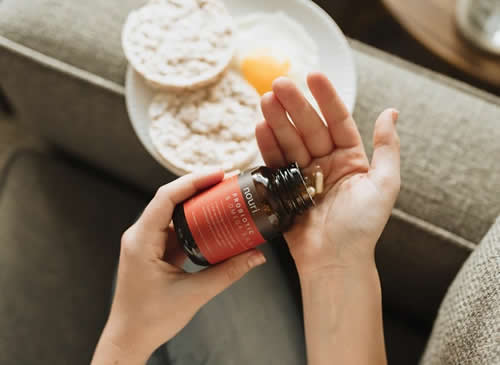
Probiotics Supplements
Courtesy: Unsplash
https://unsplash.com/photos/D37STEwmyqY
The Three Main Types of Probiotics
When the gut is made up of 90% good bacteria, the bad bacteria will remain fairly well behaved. But, an imbalance between good and bad bacteria (a condition known as dysbiosis) can lead to a takeover by bad bacteria.
At this point, most people will start experiencing undesirable symptoms and conditions like IBS, bloating, constipation, diarrhoea, halitosis etc. Not only will dysbiosis cause your health to suffer, but your immunity will go down too, making you more susceptible to getting colds, flus and other infections.
What Causes Dysbiosis?
Stress, the type of food you eat, antibiotics and ageing can all contribute to a gut imbalance, which is why probiotics come highly recommended for overall health.
While you can always balance your gut by regularly eating probiotic rich foods like yogurt, kefir, kimchi, and sauerkraut, most people don't eat enough of these foods, so taking probiotic supplements has become the norm.
Probiotics make it so that you don’t need to needlessly suffer from gut problems, and the following three types of probiotics are a good place to start:
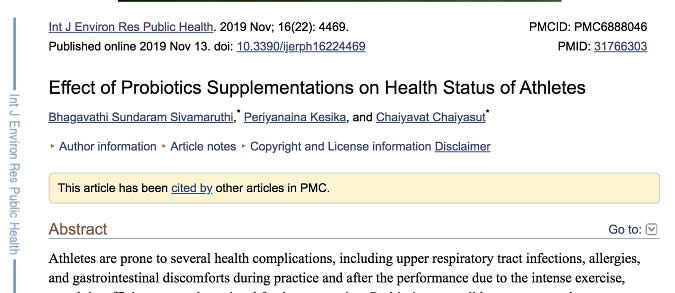
https://www.ncbi.nlm.nih.gov/pmc/articles/PMC6888046/
Lactobacillus and Bifidobacterium
Backed by over 500 clinical trials, lactobacillus and bifidobacterium probiotic strains produce lactic acid for the benefit of overall gut health. There are different strains in the lactobacillus family whose research helps us to understand how beneficial this probiotic is to the body.
Lactobacillus acidophilus is endemic to the large and small intestine and it has been shown to decrease the incidence of respiratory infection in athletes in one study, thanks to its immunity boosting properties.
- Casei: Studies show that this strain can help with antibiotic-induced diarrhea and chronic constipation.
- Rhamnosus has been shown to reduce diarrhea related to travel as well as IBS symptoms.
- Bulgaricus: Helps to maintain the integrity of the intestinal lining, thus contributing to recovery from inflammatory bowel diseases like Crohn's disease.
- Salivarius: Produces enzymes that destroy bad bacteria, including the stuff that causes bad breath. It also helps with bloating and extra gas.
- Brevis: Commonly utilized to treat urinary tract infections, it also helps to create better digestion and immune function.
- Paracasei: It's a part of normal gut bacteria and has been shown to alleviate IBS.
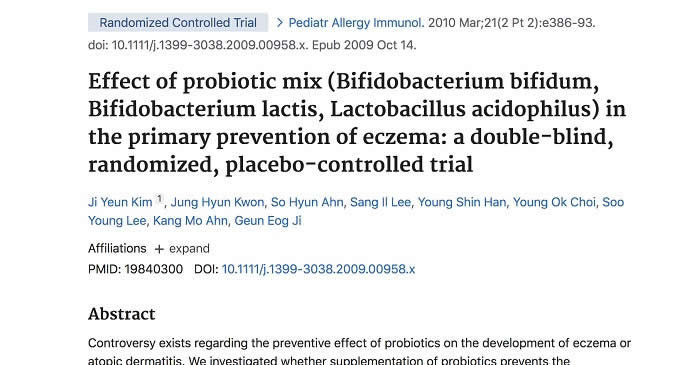
https://pubmed.ncbi.nlm.nih.gov/19840300/
- Bifidobacterium infantis: Is a probiotic primarily found in dairy products and it's beneficial for digestive health. It works by producing acids to stunt the growth of harmful bacteria in the colon while lowering the overall ph within the intestinal tract. It has also been shown to relieve IBS, constipation, diarrhea, and abdominal pain.
- Bifidobacterium lactis: Has been shown to prevent eczema.
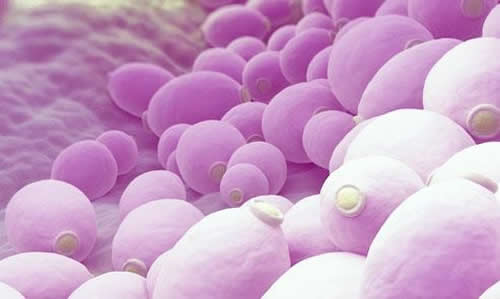
S. boulardii, the friendly yeast
Courtesy: The Four Winds
https://thefourwinds.com/blog/shamanism/s-boulardii-friendly-yeast/
Saccharomyces Boulardii
Saccharomyces boulardii or S. boulardii for short, is a beneficial yeast that acts as a probiotic in the body to support the regeneration of the intestinal microbiome. This helps to regulate the intestines and protect them from pathogens and anything that is damaging to the intestinal lining.
This healthy bacteria can go a long way to rebuild the gut wall if you have a leaky gut for example. It has also been shown to help with regulating IBS, shortening the time at which one suffers from diarrhea while helping to regain lost weight much quicker, especially in the case of antibiotic use associated with diarrhea. This unique yeast is capable of protecting and stabilizing healthy microbiomes during certain challenges, such as during exposure to certain pathogens such as traveller’s diarrhea.
If you want to quickly re-establish a healthy microbiome, it’s helpful to use s.boulardii as it has been shown to speed up microbiome recovery during antibiotic therapy, for example. The best part is that this type of yeast is non-sporing, which means that it won’t relocate to other parts of the body from the gut, or even colonize the gut itself.
It can also help to reduce the amount of ulcers present in the stomach. It is also linked with helping to reduce inflammation, intestinal permeability and colonization of the intestines by candida albicans in mice with colitis.
Studies have also shown that it can help to reduce the number of bowel movements produced by people with crohn's disease.
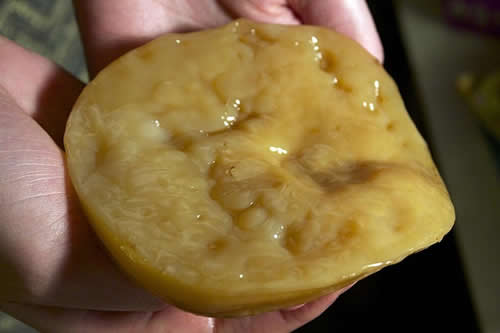
Kombucha SCOBY mushroom Courtesy Wikipedia
https://en.wikipedia.org/wiki/File:SCOBY_mushroom.jpg
Soil based organisms (SBO)
Ideally, humans would get soil based organisms through contact with dirt. But, since we don’t get much contact with the soil anymore, we also miss out on the miraculous benefits of these probiotics. That's why people are looking at incorporating SBOs into their diets.
Because they’re spore-forming, SBOs can colonize your gut, and they’ve been shown to help with all sorts of digestive issues like IBS and autoimmune diseases. They can cause really big improvements in leaky gut symptoms, decrease inflammation, help with respiratory tract infections, and alleviate diarrhea.
Why Use All Three?
A probiotic protocol that includes all three of these probiotic categories can be the key to healing leaky gut, IBS, autoimmune disease and overcoming a myriad of gut issues. That’s because different organisms affect different parts of the body.
If you have existing sensitivity to probiotics, you can start with one of them, such as the lacto bifido probiotic, followed by the s. boulardii and lastly add a soil-based probiotic. That way, you’ll know what feels good and discern what you should use and what you should let go of.
Natural Sources of Probiotics
Probiotics are naturally found in certain foods such as:
- Kefir: aka fermented milk
- Raw sauerkraut: German fermented cabbage
- Miso soup: A Japanese soup of fermented soy.
- Tempeh: An Indonesian soy-based product.
- Kimchi: A Korean dish with various fermented vegetables.
- Kombucha: An Asian fermented sweet black tea that is made with a SCOBY- a symbiotic colony of bacteria and yeast.
Other popular probiotic rich foods include yoghurt, raw apple cider vinegar, and unpasteurized cheese. These are the best natural sources of probiotics which you can incorporate into your diet to effortlessly maintain a healthy microbiome.
The Importance of Probiotics on Human Health Cannot be Overstated
In the not-so-distant past, we know that humans slept better, worked harder, ate food with high nutritional value and consumed a lot of fermented foodstuff. Produce was harvested and eaten almost immediately.That’s why our ancestors had a healthy gut and a bigger biodiversity of bacteria.
Nowadays, produce is trucked from miles away and is often viable for weeks later. The vegetables we buy now are sterilized, water blasted and bleached in all sorts of chemicals to preserve their appearance and increase the sellers bottom line. Whereas if you get a piece of broccoli from your garden, it starts looking worse for wear within a couple of days (and that’s a good thing).
We suffer from all sorts of gut problems because we don't have the correct amount of probiotics in our stomach, and we often do other things to kill it, like consuming processed foods and taking too many antibiotics. The human gut population is shrinking.
That’s why it’s becoming increasingly important for most people to supplement with a high-quality probiotic. It’s one of the best things that you can do to maintain homeostasis in the body, because gut bacteria is responsible for so much of our health.
It plays a vital role in breaking down indigestible food products that make through the small intestine, releasing vitamins and fatty acids that are important to the body. Good bacteria can also prevent inflammation and suppress the overproduction of toxic bacteria, preventing all sorts of embarrassing and uncomfortable health conditions.
In short, adopting a well-thought-out probiotic protocol can be the key to enjoying a symptom-free life.
Comments:
-
No Article Comments available